Training in Community Psychology
Training Program Components
The 3 parts of the Community Psychology Training Program are:
- Ph.D. specializing in Community Psychology, within the Health Psychology Ph.D. Program
- M.A. in Psychology specializing in Community Psychology
- Community Psychology Learning Community for undergraduate transfer students
Ph.D. Specializing in Community Psychology
The Community Psychology Training Program of the Health Psychology Ph.D. program is interdisciplinary in nature, and focused on research and practice addressing health, health disparities, and healthy communities. In addition to core community psychology training, students gain breadth through coursework in health psychology and disciplines outside psychology, guided by interdisciplinary program committees. Students develop applied research and intervention skills that enable them to practice community psychology in different community settings (e.g., nonprofits, government agencies) and/or serve as university faculty with strong practice skills. Key training elements include:
1. All community graduate students enroll in core community psychology coursework to develop concepts and applied skills, beginning early in their program. Each course in the community psychology sequence involves a partnership with a local organization to effect change in the organization and/or the community they serve. The applied skills students develop are built upon each year through a graduated sequence of courses in which they work increasingly independently using higher level skills.
Starting with Applied Research Design and Program Evaluation, students develop knowledge and build skills through working with a community agency to design an evaluation. Next, in the Community Psychology course, they implement an intervention with a community organization and develop a grant proposal to support a more extensive project. Doctoral students also enroll in two practicum courses engaging in more complex and independent applied research/intervention projects, and the capstone Community Interventions course involves independent projects and mutual supervision by the students. Thus, students sequentially gain experience in design, implementation, and supervision of projects as they progress through the program.
2. All PhD students also complete specific milestone projects: a 2nd year project/thesis, a comprehensive project, and a dissertation. Each of these can be, and almost all have been, applied in nature and action oriented. Projects typically involve coordination with our community partners, building student skills to allow them to intervene in the community.
3. Interdisciplinary health psychology coursework provides a broad background in health, including health disparities and contextual factors related to health outcomes. Substantial coursework in other disciplines provides important breadth of skills and facilitates students’ ability to develop interdisciplinary partnerships. Through this coursework, students can augment their core required curricula by developing additional expertise in areas including communication studies, geography and urban planning, public policy, and qualitative and quantitative methods. Some community students have earned certificates in such areas as nonprofit management and public health services.
4. Engagement in the community through participation in a community research team within the Community Psychology Research Lab.
A total of 78 semester hours of coursework are required for the degree (see details at http://healthpsych.charlottewp.psapp.dev/program-description, and the Health Psychology Student Handbook for more information).
Masters Training in Community Psychology
For over 30 years the department offered training in Clinical/Community Psychology at the Masters level. Starting in the 2015-6 academic year, a limited number of students who are interested in receiving training in community psychology are admitted into the MA program in psychology. This program does not provide clinical training. Instead, the program is designed for students who wish to develop applied community skills but do not wish to or are not yet ready to earn a Ph.D. Core requirements are similar to those for the Community Concentration of the Ph.D. in Health Psychology, but the MA program requires only 30 credits and does not require the interdisciplinary training or research training and dissertation required in the Health Psychology Ph.D. program. Students interested in Ph.D. training in Community Psychology can apply to earn the MA degree, and then can apply for the community concentration of the Health Psychology Ph.D. program. A description of the requirements for the MA program can be on the MA Psychology’s website. Note that there are links to more specific details about the types of courses that students typically take in the MA program at the bottom of that page, labeled “Master of Arts Program Information” and “Master of Arts Plan of Study (Updated Fall 2017)”.
Community Psychology Learning Community for undergraduate transfer students
Beginning in 2013, we instituted the undergraduate Community Psychology Learning Community (CPLC) to increase our undergraduates’ exposure to community psychology. We have provided undergraduate coursework in community psychology for 30+ years and have engaged many undergraduates in our applied research efforts. A large percentage (>50%) of our 1000+ psychology majors are transfer students, and many others only learn of community psychology when they are juniors or seniors (if at all). The CPLC is designed for students with interests in social action and applied work and/or graduate school. As part of the CPLC, students take Community Psychology and Research Methods courses and become involved in faculty research or practica soon after entry. Through the Community Psychology Learning Community course, students become familiar with the university and the Charlotte community, and develop a sense of community among themselves, while learning to apply community psychology principles.
From Top – students Kelsey Grant and Avonne Armbrister presented their CPLC group community research project at a campus Community Engagement Showcase; the 2016 CPLC completed a low ropes course; the 2015 CPLC visited and developed a mentoring program for the Community Culinary School of Charlotte (with Chef Ron of the CCSC); the 2015 CPLC members at their mid-year celebration (Pam Seibert, Janel Blythe, Katty Jurado, Keenan Crocker, Jim Cook, Gabby Ledezma, Chelsi Kithcart, Rachel Weidenhammer and Evelyn Lopez). We have also encouraged our undergraduates to take advantage of several programs that the university provides to support undergraduate research and engagement. In particular, our faculty have supervised students who have received summer research fellowships through the Charlotte Research Scholars and Charlotte Community Scholars programs, which provide intensive 10-week programs for students to work with a faculty member on an applied research project. Students receive a $4000 stipend for their full-time involvement during the program. 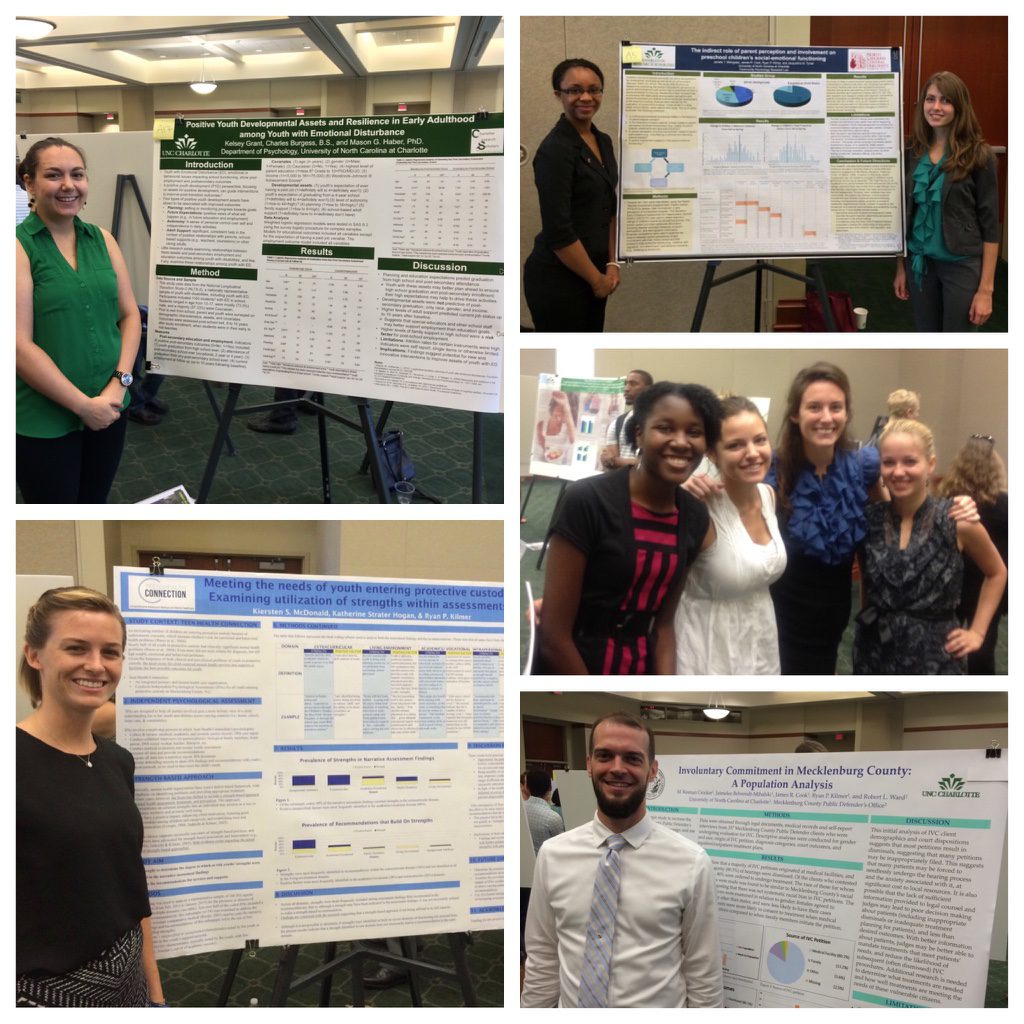
Faculty and our graduate students work with the undergraduates in the Charlotte Research Scholars and Charlotte Community Scholars programs.: Frin Top – Kelsey Grant (2014); Janelle Billingsley and Chelsea Matson (2012); Keyara Pierre-Lewis, Rachel Storace, Lauren McGrath, and Nancy Kempa (2012); Kiersten McDonald (2015); Keenan Crocker (2016).
Engaging Students in the Community
Early student involvement in applied, skill-building activities is central to our training programs. We believe in engaging students in applied community efforts from the first semester and building upon those efforts throughout the program. In order to support this applied focus, our training employs several key strategies:
1. We build upon enduring partnerships with local organizations. These partnerships allow us to continue projects over multiple years, and use our experiences with partners to identify additional student training opportunities.
Examples of these partnerships include work with:
- A family support and advocacy organization serving families with children with mental health issues. We have helped them develop capacity to evaluate their programs and this partnership has involved faculty serving on their interim board, student theses and assistantships, several iterations of Photovoice projects with youth served by the organization (involving undergraduates and graduate students), a leadership development project for youth, and joint presentations at national and international conferences.
- A large agency providing treatment and preventive services for children and families. We have helped them develop capacity to evaluate several of their programs, aided them in improving their efforts to serve families, had joint presentations at conferences, and have partnered on development of grant proposals.
- The main child advocacy organization in Charlotte. They have used our student and faculty expertise to support their Research Advisory Committee, help organize community advocacy efforts, and develop research and policy briefs, all to aid the organization to improve the lives of children.
- The local school system. While our partnership has largely involved evaluation of their pre-kindergarten programs, students have gained experience working on these projects as well as developing milestone projects focusing on these populations and using school system data.
These are in addition to the more temporary or intermittent project-oriented relationships we have with community groups, some of which are briefly described below.
2. Virtually all community graduate students desiring applied assistantships have received them, gaining valuable experience in program evaluation and applied research. These assistantships quickly immerse students in applied work, sometimes even before they start classes. For most students, these assistantships continue throughout the summer. Collectively, the four core faculty for the Community program have funded 89 full (20-hours/week) or partial (10-15 hours/week) graduate assistantships across the 2008-9 to 2016-17 academic years.
3. Each community graduate student also becomes a member of one or more research teams in the Community Psychology Research Lab (supervised by Drs. Jim Cook, Ryan Kilmer, and Victoria Scott), which integrate research and service in applied community projects. Through these teams (typically having 5-15 members each), many of the applied projects are implemented. Undergraduates have the opportunity to join these teams and develop their skills, and those involved in the CPLC are strongly encouraged to join a team. These projects and partnerships are supported through multiple grants and contracts (see Funded Project). Undergraduates are mentored by graduate students, and learn from them, while graduate students gain supervisory experience; all enhance their applied research skills. The Lab provides a rich source of projects for required programmatic milestones for the graduate students (comprehensive examination, second year research and course-specific projects). As part of the development of the CPLC, our undergraduates (partnering with our graduate students) have developed a community psychology video that is being shown in our Introductory Psychology classes to help increase students’ awareness of community psychology.
Examples of the applied projects in which our research teams have recently been engaged include:
- Evaluating MeckCARES, a system of care for children with severe emotional disturbance and their families
- Evaluating a school–multi-agency partnership to address the needs of children and families in an impoverished neighborhood (and helping plan and support the initiative);
- Assessing the impact of “family partners” who provide support for families involved with child protective services;
- Using data to guide supportive “wraparound” processes for families living in public housing developments;
- Evaluating and supporting programs assisting in the transition from adolescence to adulthood
- Evaluating consumer-operated mental health recovery programs
- Evaluating a parent education program
- Integrating mental health and primary health care to improve patient health outcomes
- Understanding and promoting breastfeeding initiation and duration.
Student and faculty research have resulted in multiple conference presentations, publications, and funded projects. In addition, team members have been awarded a number of honors for their work. Examples of presentations with our partners include:
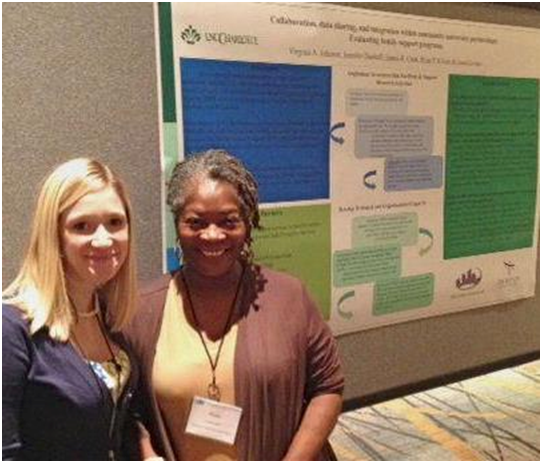
When possible, we support our community partners in travel with us to co-present at conferences. Virginia Johnson and Rosa Underwood, our partner from Thompson’s Child and Family Focus, presented on the evaluation of Thompson’s family partner program that supports families involved with child protective services (Community Campus Partnerships for Health Conference, 2012, Houston.
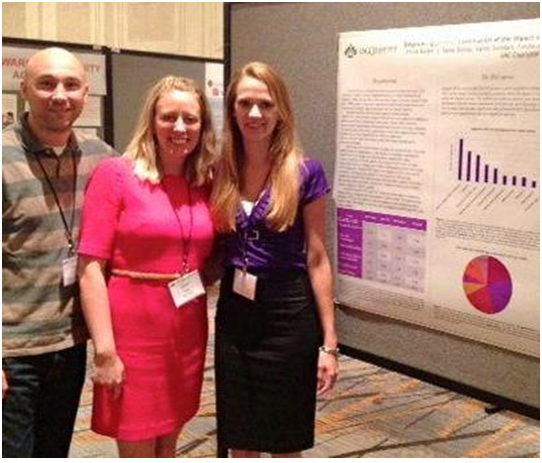
Kevin Markle, from ParentVOICE, Emma Burgin, and Taylor Bishop also presented a poster at the CCPH Conference in Houston, describing our partnership supporting ParentVOICE with evaluation of their family advocacy and support programs.
BUILDING COMMUNITY IN THE COMMUNITY PROGRAM
We take the values of and principals of community psychology seriously. Collaborative work (and play) are important parts of our program. To build a sense of community within our program, we regularly engage in social and professional group activities on and off campus, involving faculty, graduate students and undergraduates. Examples of these include:
Participating in the annual Southeast Eco-Community Psychology conference, which rotates among different academic programs. Faculty, graduate students and faculty go to this regional, student-run conference, which is a great opportunity for students’ first professional presentations and an opportunity for our students to get to know one another and other students and faculty from around the southeast
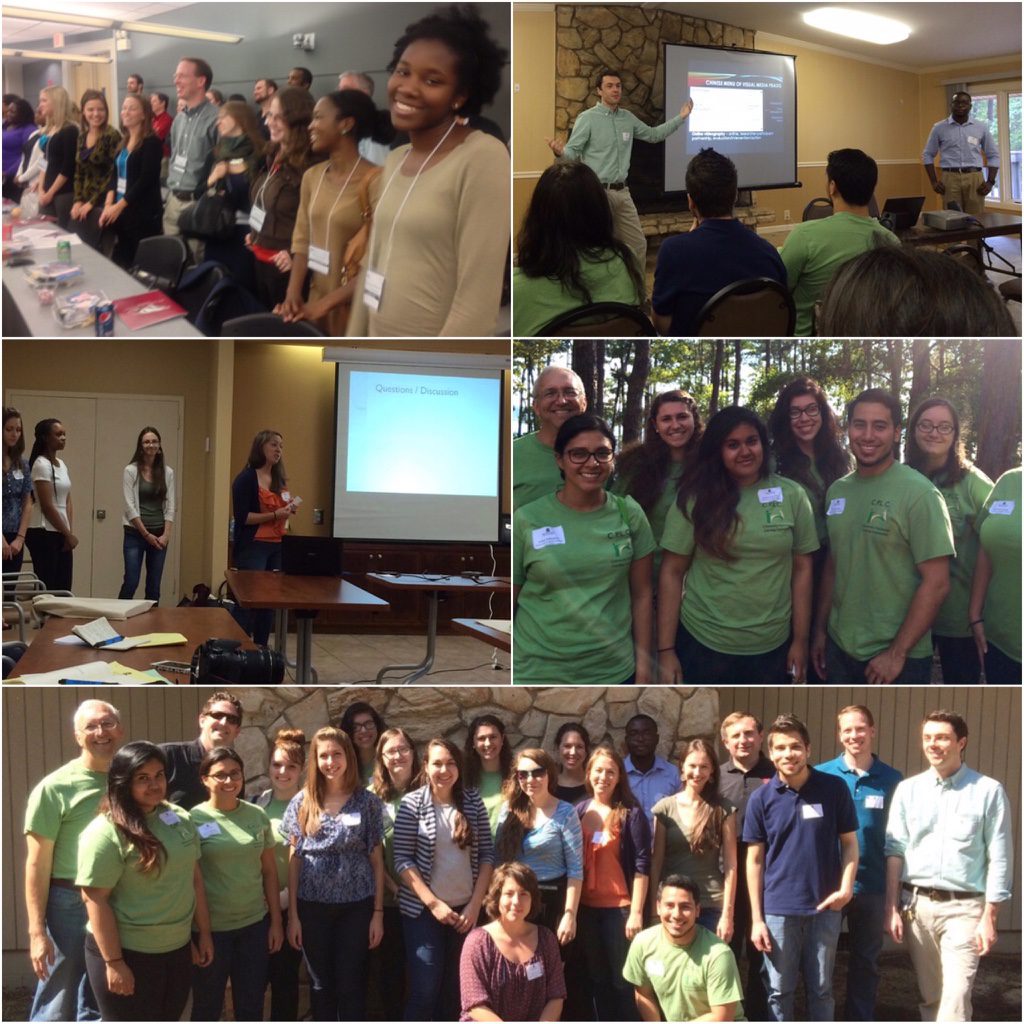
From Top: A group attending the 2012 ECO conference at NC Central University; and from the 2014 ECO – graduate students Tom Laporte and Nelson Knight; undergraduates (and Charlotte Research Scholars) Chelsea Matson and Janelle Billingsley, with graduate students Jackie Larson and Jackie Tynan; the entire Community Psychology Learning Community; the full UNCC contingent at the 2014 ECO, Hickory Knob State Resort Park, SC.
Our students regularly present at Society for Community Research and Action’s Biennial conference, where we connect with our alumni.

From Top – our students, faculty and alumni posing at the 2015 Biennial; Pam Imm, alumnus, receiving the Distinguished Practice Award 2015, with Bret Kloos, President of SCRA and Matt Chinman; students, alumni and faculty posing with our Outstanding Program Award at the 2013 Biennial; Jackie Tynan, Jaimelee-Behrent Mihalski and Jackie Larson presenting at the 2016 Biennial.
Every year we have a holiday pot-luck party at Jim and Lois Cook’s house
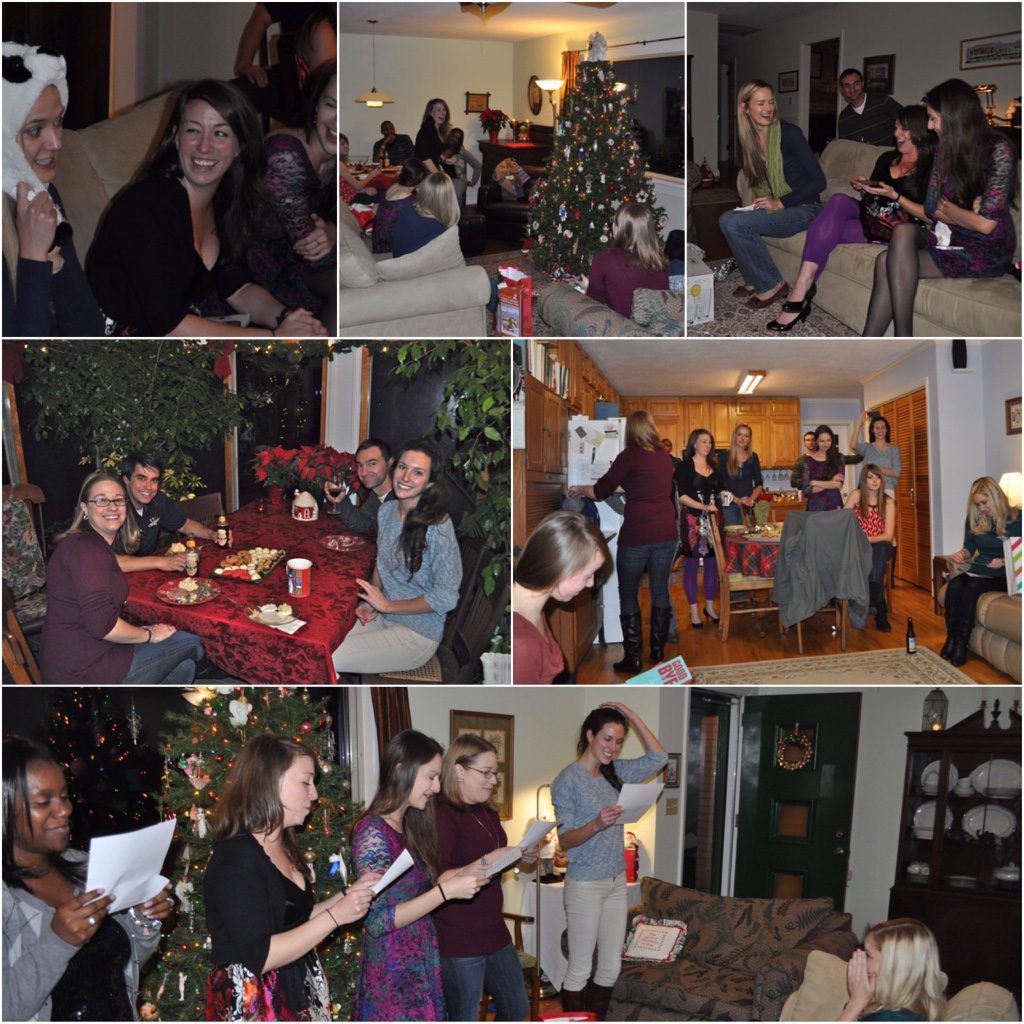
Periodic social events provide opportunities for us to eat, drink and play together.
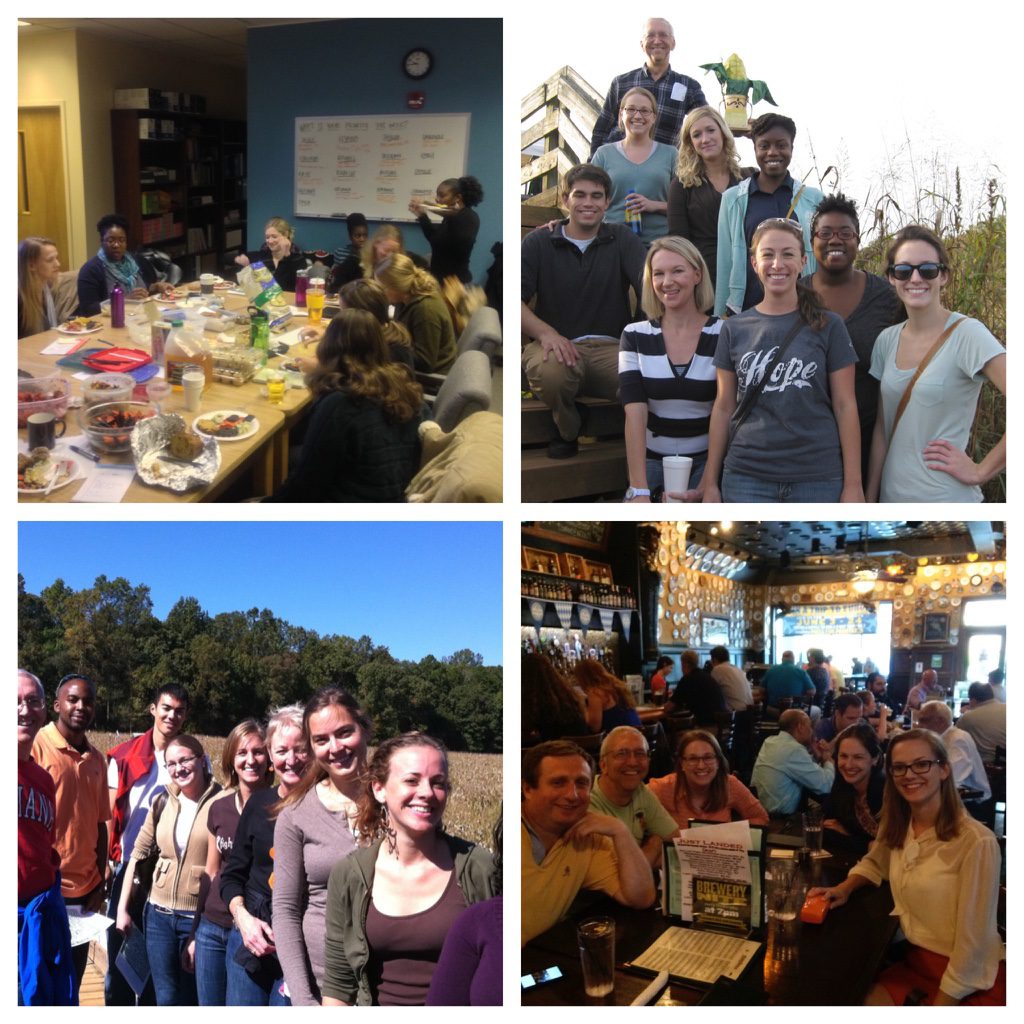
From Top L: Pot luck breakfasts or lunches are common occurrences; Top R (2012), Bottom L (2010): We regularly go to the Amazing Maize Maze in Rural Hill NC, and often divide into teams to see who can make it out of the maze first and have their names on the winners’ corn trophy; Bottom R: a group of us came together to send off Serhii Volavakha, the Ukrainian Fullbright Fellow who joined our team from 2014-5 (Serhii, Jim Cook, Kate Hogan, Jackie Larson, Taylor Scott).